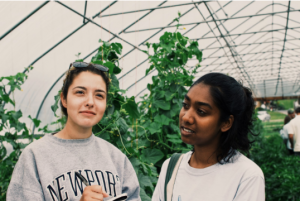
This weekend, the garden interns attended Open Farm Day in upstate NY. Open Farm Day is an annual event where farms in the NY area open their doors to the public for tours, information, and produce sale. Interns toured a few local farms, and here are their reports:
Common Thread CSA
Common Thread CSA, located in Hamilton, NY is a Community Supported Agriculture program. Residents of Hamilton and communities as far as Utica own shares of the farm, providing them with fresh produce once a week. They, in turn, support the farm financially. On our visit, we learned about some of their methods to increase the sustainability of their operation. Raised beds, for example, allow for more water traction and more food grown in a smaller amount of space. 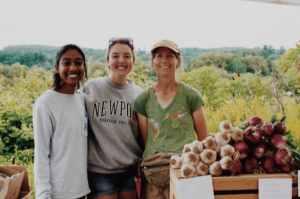 Additionally, by rotating their crops every season, they avoid depleting the soil of its resources, giving them soil time to replenish itself each season. Common Thread also uses their own compost, irritates with a spring-fed pool, and only uses organic pesticides when they are absolutely necessary.
Additionally, by rotating their crops every season, they avoid depleting the soil of its resources, giving them soil time to replenish itself each season. Common Thread also uses their own compost, irritates with a spring-fed pool, and only uses organic pesticides when they are absolutely necessary.
The next step for Common Thread is a loan or donation system that would provide local, healthy food to refugees in Utica. It is important to Common Thread that everyone has access to affordable, healthy food, and they are working on making that possible in our area. We love to see local farmers working towards a bigger cause.
Drover Hill Farm
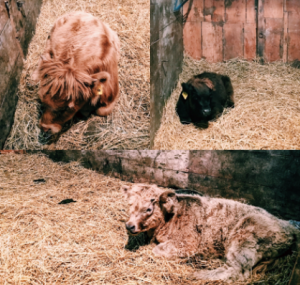 Our next stop was Drover Hill Farm, located in Earlville, NY. Drover Hill is one of the only pasture-raised cattle farms in the area. Cows that are not raised on grass are often fed grains and supplements to speed up their growth. This diet is unhealthy for the cows as their bodies were not built to digest these products as well. Pasture-fed cows, such as those at Drover produce healthier, leaner meats, as well as a production cycle that benefits the environment, as less energy goes into growing grass than grain.
Our next stop was Drover Hill Farm, located in Earlville, NY. Drover Hill is one of the only pasture-raised cattle farms in the area. Cows that are not raised on grass are often fed grains and supplements to speed up their growth. This diet is unhealthy for the cows as their bodies were not built to digest these products as well. Pasture-fed cows, such as those at Drover produce healthier, leaner meats, as well as a production cycle that benefits the environment, as less energy goes into growing grass than grain.
Drover Hill was also home to many award-winning cows, bred for their straight backs, foot and leg structure, as well as many other categories. Open Farm Day participants were also given the chance to name their three new calves; we suggested Larry, Moe, and Curly!
Fruit of the Fungi
The next farm of the day was a little out of the ordinary as it was a farm dedicated to growing fungi, specifically mushrooms! Fruit of the Fungi, also located in Earlville, was a peaceful 15-minute drive from Drover Hill.
The farm is split into two operations: mushrooms produced from logs and those from incubation. 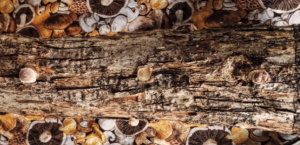 The process to grow shiitake mushrooms in logs is a long but very interesting journey. First, a fresh log of hardwood, usually maple or oak, must be found. It’s important that the log is a hardwood because the bark needs to be tough and hardy so it will stay on for a long period of time. One inch holes are drilled and inserted with shiitake mycelium which comes from cultures they grow and sawdust.
The process to grow shiitake mushrooms in logs is a long but very interesting journey. First, a fresh log of hardwood, usually maple or oak, must be found. It’s important that the log is a hardwood because the bark needs to be tough and hardy so it will stay on for a long period of time. One inch holes are drilled and inserted with shiitake mycelium which comes from cultures they grow and sawdust.
Cheese wax is used to close up the holes and any other cuts in the bark to prevent the sawdust from drying out. After a year, the mycelium has developed enough and the logs are submerged into cold water for about 24 hours. The drastic temperature difference causes the shiitake mushrooms to grow. The logs usually last about 5-7 years but as they get older, fewer mushrooms will be produced.
The farm also has a small incubation room where they are able to grow a larger variety of species as well as produce mushrooms year round. Other perks to the incubator are the quick return in the number of mushrooms (2-3 months) and the fact that fewer variables will affect the growth.
Sawdust is compacted into blocks in which mycelium is added. The blocks are then sealed in bags and holes are popped in them to control the airflow. The temperature in the coolers range from 65-95 degrees in order to prevent contamination. The types which they had during our visit were lion’s mane (Image 1) which has a seafood-like flavor, golden oyster (Image 2), shelf (Image 3) and shiitake mushrooms (Image 4.)
Shelf mushrooms are very similar to the ones you may find on the forest floor but because of how fibrous they can be they are usually eaten dry or crushed into powder. The shiitake mushroom aren’t placed in bags as they would cause the mushrooms to become deformed. You must spray them with water since they lose moisture more quickly. They respond well to movement so bouncing the blocks around causes mushrooms to grow.
Johnston’s Honeybee Farm
 This small, family run apiary is located in Eaton, NY. Johnston started his operations after working on a commercial farm as a young man. After retirement, he decided to continue his passion for working with bees and started his own business. The bee business isn’t a painless one. Johnston spoke about getting stung up to 200 times a day. Yet, his respect and care for the bees were clear. Often times, he wore nothing but a face-net when out in the hives, knowing that his bare hands and skin would make him interact with the bees more carefully and gently.
This small, family run apiary is located in Eaton, NY. Johnston started his operations after working on a commercial farm as a young man. After retirement, he decided to continue his passion for working with bees and started his own business. The bee business isn’t a painless one. Johnston spoke about getting stung up to 200 times a day. Yet, his respect and care for the bees were clear. Often times, he wore nothing but a face-net when out in the hives, knowing that his bare hands and skin would make him interact with the bees more carefully and gently.
We were able to see the honey extraction process, as the wax coating was melted off a tray, and the honey then spun in a centrifuge which sent the honey down to a holding cell. Raw honey is run through sieves to remove impurities such as wax and some pollen. The honey can then be sold as a solid. Additionally, some honey is headed to exactly 137 degrees in order to make it a liquid, which is what you may be used to in the supermarket. The liquid honey tastes much sweeter, but the raw honey has a special thickness and grain to it that we loved. Fun fact: the taste and appearance of honey can vary significantly based on the flowers the bees have access to pollinating!
Red Gate Farm
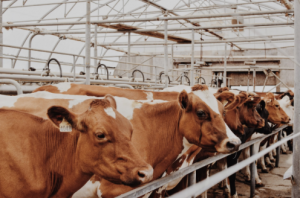 Our last stop of the day was Red Gate Farm, which has been around for 16 years. This dairy farm is home to 360 cows, who are milked twice a day. The rest of their days are filled with grass grazing and milk production. Red Gate also used an underground tunnel to move the cows from pasture to milking room without putting them in danger of traffic and busy streets. At the end of our visit, we enjoyed some incredible salted butter, cream, and buttermilk products made right at the farm!
Our last stop of the day was Red Gate Farm, which has been around for 16 years. This dairy farm is home to 360 cows, who are milked twice a day. The rest of their days are filled with grass grazing and milk production. Red Gate also used an underground tunnel to move the cows from pasture to milking room without putting them in danger of traffic and busy streets. At the end of our visit, we enjoyed some incredible salted butter, cream, and buttermilk products made right at the farm!

